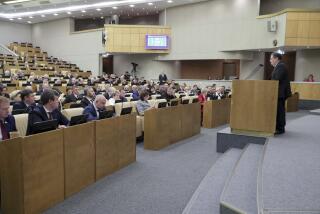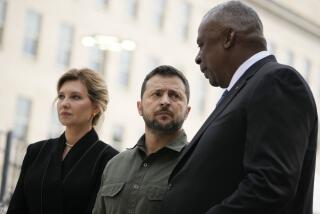Soviet Military Spending Drops for 1st Time Under Gorbachev
WASHINGTON — Soviet military spending fell last year for the first time since President Mikhail S. Gorbachev came to power in 1985, reflecting the impact of a domestic economic crisis and “new thinking” in the Kremlin, the Pentagon said Tuesday.
The Defense Department also said in its annual assessment of Soviet military strength that Moscow slowed the pace of arms production last year, particularly of tanks, artillery pieces and other equipment for its ground forces.
The report, the ninth in a series started by then-Defense Secretary Caspar W. Weinberger, departed from previous editions by striking an encouraging tone in describing the security threat to the West posed by the Soviet military.
“The likelihood of a conflict stemming from U.S.-Soviet confrontation is lower than it has ever been in the postwar era,” the report said, noting the historic changes of the last year, including the breakup of the Soviet empire in Eastern Europe.
The report said Soviet defense spending last year fell by 4% to 5% from the 1988 level. Pete Williams, a Pentagon spokesman, said that in the period from 1985, when Gorbachev assumed power as general secretary of the Soviet Communist Party, to 1988, Soviet military spending rose by an annual average of 3%.
U.S. defense spending since 1985 has declined by an annual average of about 2% and is headed for a bigger drop as a resulf of current negotiations between the White House and Congress over the 1991 budget year, which starts next Monday.
The Pentagon report said the most pronounced reductions in Soviet arms production in 1989 came in ground forces materiel. The Soviet Union built about 1,700 tanks last year, half the previous year’s total. Production of artillery pieces fell by nearly 20% and multiple-rocket launchers dropped to 300 from 480.
In his introduction to the report, Defense Secretary Dick Cheney stressed that while Gorbachev was reducing arms production in most areas, he was maintaining Soviet strength in strategic, or long-range, nuclear forces.
More to Read
Sign up for Essential California
The most important California stories and recommendations in your inbox every morning.
You may occasionally receive promotional content from the Los Angeles Times.










